Living in a Moroccan Medina
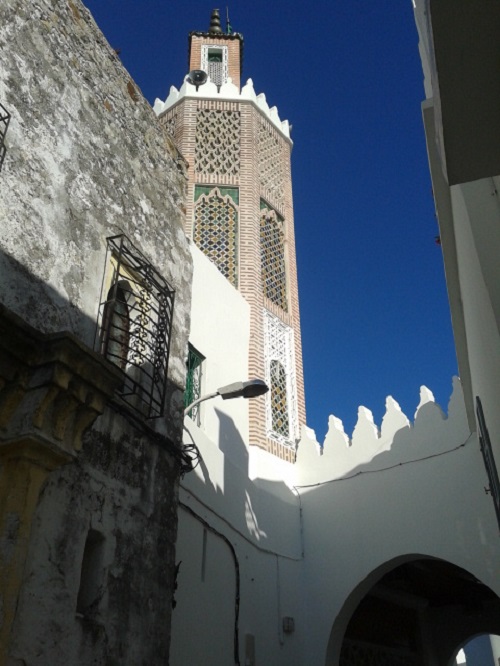
Hello again, Black Gate readers! You may have noticed that I dropped off the blog, and indeed the rest of the Internet, for all of October. You did notice, didn’t you? You didn’t? Well, I was gone. I spent the entire month on a writing retreat in Tangier, Morocco. I’ve written about visiting Tangier before on this blog, but this time I decided to dedicate a longer time in the city to some writing. My current project, The Last Hotel Room, is a novel set in contemporary Tangier, and I thought it a perfect opportunity to try out my own version of a writing retreat.
Through local contacts I was able to rent a house in the medina, the old historic quarter. My house was a traditional building of northern Morocco — two stories and a rooftop terrace surrounding an airshaft topped with glass. Sunlight and ventilation came courtesy of the airshaft, the only other windows being small ones in the downstairs kitchen and upstairs kitchenette. The interior was cleverly designed so that each room felt open to the sunlight from the airshaft while remaining out of view of the other rooms, providing openness and privacy at the same time.
This sort of architecture has an unusual acoustic effect. Noises next door and on the street just outside sound like they’re coming from inside the house. Your neighbor’s door opening sounds like your door opening. It’s a bit weird at first, but it never makes you nervous because your house is a fort. Doors are made of metal and secured with heavy bolts. The airshaft has a cage-like barrier to keep people from dropping in unannounced. My two windows were both well above street level and protected with iron bars.
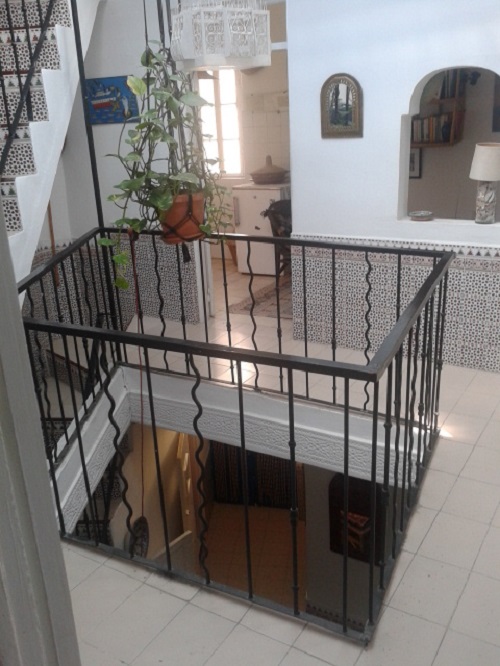
Moroccans seem to turn their houses into bunkers more out of habit and historical memory than practical need, for in the medina there is little crime. When everyone is living on top of everyone else and everyone knows everyone’s business, how could there be? At night, lone women and children walk through the dim alleys without fear. I myself never had any problems in my neighborhood. There are dangerous areas in Tangier (some outlying neighborhoods, the esplanade after dark) but the medina is not one of them.
Privacy is what Moroccans look for in a house. One Moroccan acquaintance living in Amsterdam was shocked, as was I, to discover the Dutch often leave their curtains open on the ground floor. You can be walking along the sidewalk and peer right into their living room to spot the family relaxing just a few feet away. While I find this odd, Moroccans find this unthinkable. One friend declared, “We cannot live without walls!” A Dutchman explained the curtains stay open to prove they have nothing to hide. Neither do I, but that doesn’t mean I want strangers peering into my living room.
The Moroccans do, indeed, need walls. It’s the only thing separating them from their neighbors. You can hear everything happening in the immediate area. In the case of my house that meant overhearing two very different groups socializing. The stairs outside my front door were a popular hangout for the neighborhood boys to sit while fiddling with their cell phones, playing music, and talking late into the night. The alley behind my house was a popular hangout for the neighborhood women to fiddle with their cell phones and talk late into the night. They did not play music and were generally far quieter than the boys except when one woman, who I dubbed La Bruja, would come over to start a loud screaming argument. This happened most nights. She seemed to enjoy creating drama There’s one in every neighborhood!
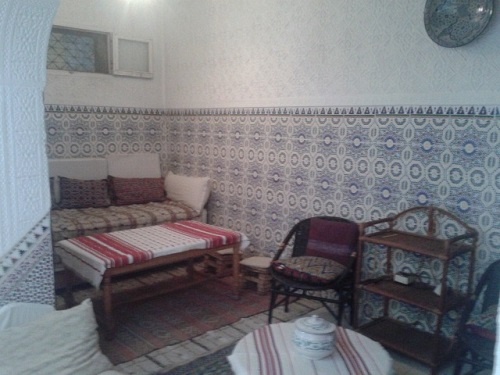
My house was filled with other sounds as well. A mosque stands just uphill, and is run by a sect that believes that just before the dawn call to prayer there should be a sermon to wake you up and get you spiritually ready for the day. Thus every morning around 5am, Arabic would seep into my dreams, followed by the musical tones of the muezzin calling the faithful to prayer.
Being a port on the Strait of Gibraltar, Tangier has always been multicultural. After Arabic, French is the main language, followed closely by Spanish. Many people do not speak English so Spanish is my primary language when I’m there. With such a close-knit neighborhood, strangers would often come up to me and address me in Spanish, having heard that’s the language I preferred. One day I was climbing the hill up to the Casbah when a stranger in a cafe called out in Spanish, “Go on that road over there, it will get you to your house quicker!” I replied, “I know, but I need to go to the market.” “Oh, right,” he said, seemingly embarrassed that he had forgotten where I normally go buy fruit. I don’t know how all those famous writers managed to misbehave in Tangier with everyone knowing their business!
While I was there the Muslim world celebrated New Year. Happy 1437! Unlike in the West, there were no displays of fireworks or binge drinking. Instead it’s more of a holiday for kids. Suddenly all the neighborhood children were running around with new toys. In addition, the markets filled up with cheap tambourines and drums and every boy and girl ended up with one. Why? Because as every child in every part of the world knows, NOISE IS AWESOME!!! The streets were filled with banging and shouting until late in the night. No one seemed to mind, including me. One advantage of being on a writer’s retreat in the setting you’re going to use is that nothing is a distraction; it is all research material.
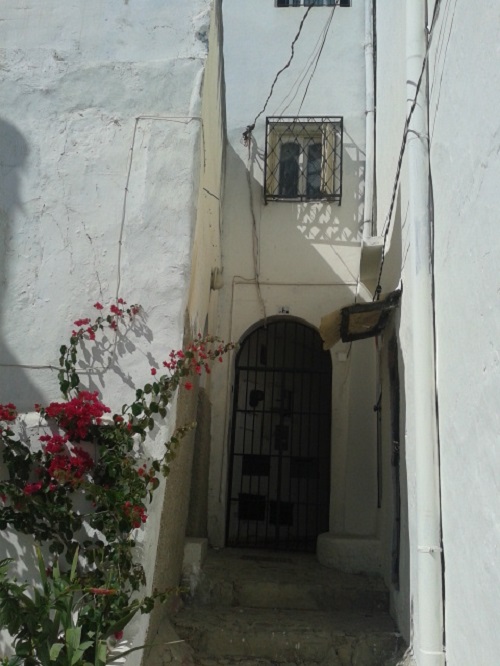
Mostly I wrote at home or in the library of the American Legation, once a center for diplomacy, now a study center with a great collection of books on North Africa. The writing went well, with a steady, unhurried, and no-stress output every day. One danger I had to guard against was the fact that I was more familiar with Morocco than my protagonist, who is a new arrival. This danger was brought home to me when I was going through the Casbah gate one day and had to step to one side to let a goat pass by. Nothing strange about that. It took me some time to realize that was something my protagonist would find odd and amusing. So while I had an excellent opportunity to learn more about Morocco, I have to consciously filter that knowledge when writing from my character’s POV.
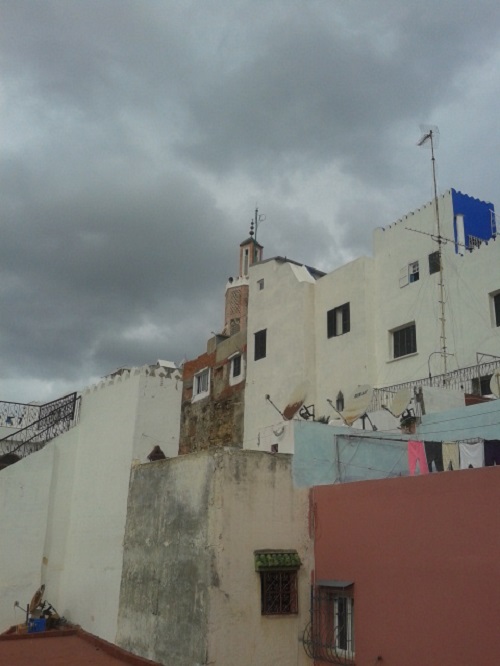
The real test of a writing retreat is the amount of work completed. I got about a third of the way through the first draft of The Last Hotel Room. I could have done more but finances dictated that I get through 28,000 words of a ghostwriting assignment as well. So all in all, my monthly productivity did not increase during my retreat. Tangier proved to be fairly distracting, thanks to my local friends and the days I took off to travel with my family. While I didn’t write more this past month, I did write better. Writing a sense of place can be difficult, and the writer has an extra responsibility when it’s a real place with real people living in it. When that place is one that is negatively stereotyped in the media, the responsibility increases even more. I suppose my novel would be more exciting with danger at every turn and hordes of Islamists slavering for my hero’s blood, but that wouldn’t be Tangier. Instead, my protagonist’s troubles are almost entirely of his own making. As Paul Bowles once said, “Tangier doesn’t make a man disintegrate, but it does attract people who are going to disintegrate anyway.”
I haven’t disintegrated yet. I’ll leave that to my protagonist.
Next Wednesday: Asilah: Visiting an old Pirate Haven in Morocco!
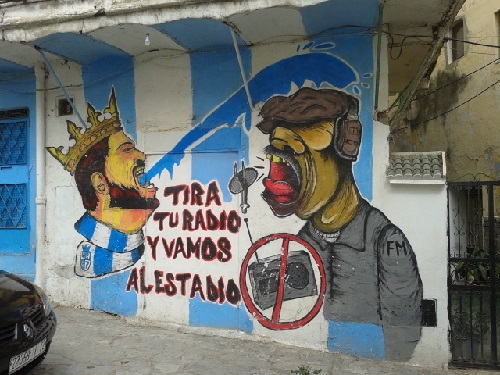
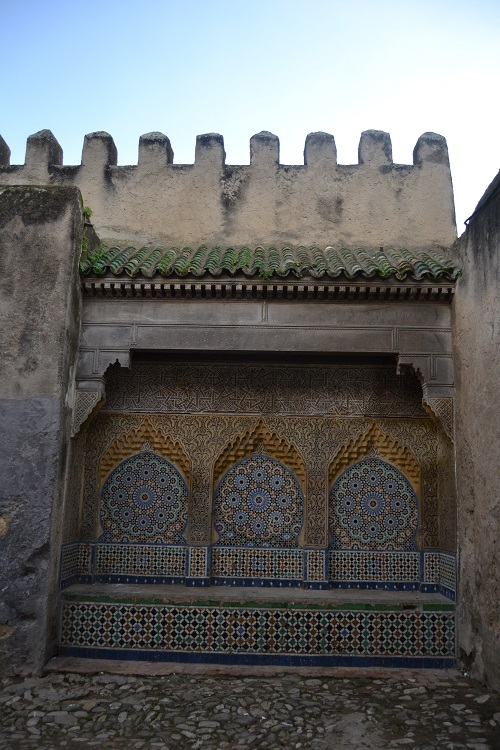
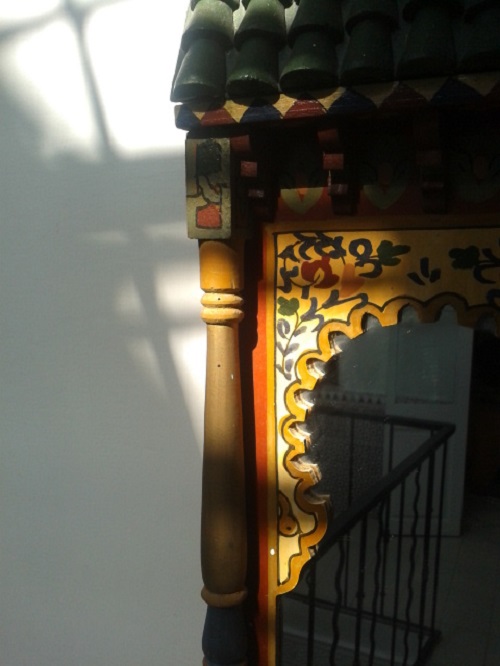
Sean McLachlan is the author of the historical fantasy novel A Fine Likeness, set in Civil War Missouri, and several other titles, including his action series set in World War One, Trench Raiders. His historical fantasy novella The Quintessence of Absence, was published by Black Gate. Find out more about him on his blog and Amazon author’s page.
Very Harold Lamb! Much envy!